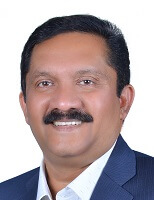With technology advancing rapidly, the needs of customers in the region is also seeing change.
With technology advancing rapidly, the needs of customers in the region is also seeing change.
Gone are the days when a simple camera setup would suffice to protect and safeguard establishments. Today’s customers are increasingly becoming aware of their requirements and the solutions that are available in the market. Here is a look at what is in demand.
According to Pradeep Nair, VP of Sales, Middle East, India and Africa at
Pelco by Schneider Electric, the Middle East has begun implementing many infrastructure changes and smart city projects. In addition, there is a high demand for sophisticated security solutions with streamlined integration of video surveillance and other security systems. As risks are always present, and as infrastructure increases, security solutions will be necessary at religious centers, malls, hotels and other hospitality locations.
 Pradeep Nair, VP, Sales,
Pradeep Nair, VP, Sales,
Middle East, India and Africa,
Pelco by Schneider Electric
“Video analytics, which is more stabilized in terms of performance, has become a key to the infrastructure and even commercial projects, helpingthe customers to use video surveillance for business analysis in addition to traditional security functions,” Nair said. “Facial recognition was a key to analytics that was required by many of the end users in city surveillance, airports and other infrastructure projects. Other top trends include seamless integration between security systems, increased focus on cybersecurity and artificial intelligence, using surveillance solutions to create efficiencies in enterprises, and cloud computing.”
Face recognition used in AI-based cameras
Authorities in the Middle East are actively looking at facial recognition as a popular solution to ensure safety and security. Recent media reports suggest that the Dubai police plans to use tens of thousands of AI-enabled cameras for facial recognition and tracking movement. Once a camera recognizes any wrong-doing, speaker systems attached to it will sound a warning. This will be done ahead of the Expo 2020 event that’s set to take place in the city.
According to Ettiene Van Der Watt, Regional Director for Business Development at
Axis Communications, facial recognition is one of the least invasive biometrics, since data is captured effortlessly and generally involves no user interaction.
“Facial recognition often uses video surveillance cameras to recognize the faces of authorized and unauthorized individuals,” Van Der Watt said. “It yields excellent performance with partial occlusions of the face, glasses, scarfs, caps, changes of facial expression, shadows, high contrasts and extreme or poor lighting conditions, and on moderate rotations of the face. Individuals can be enrolled in the system through a photograph as well as using real-time or recorded video.”
 Ettiene Van Der Watt,
Ettiene Van Der Watt,
Regional Director,
Business Development,
Axis Communications
Other biometrics-related technologies
Research agencies indicate that the biometrics market is set to see an explosive growth in the Middle East in the next few years with the United Arab Emirates (UAE) leading the growth. From 2018 to 2026, the compound annual growth rate (CAGR) is expected to 20.3 percent, according to Inkwood Research, a consultancy and research services firm.
“Most sectors today have good references within biometrics, being access control via fingerprints or something more complex like facial recognition for critical infrastructure,” Van Der Watt noted. “The last few years have seen a spike in security breaches such as identity theft and data hacking. Biometrics offers the authentication technology required to combat such issues being highly reliable and extremely difficult to fake.”
Fire safety and smart buildings
The US$1.9 billion fire safety systems and equipment market in the Middle East is expected to see solid growth in the coming years after government regulations recently called for better solutions. 6Wresearch expects this to be $3 billion by 2024, growing at a CAGR of nearly 8 percent.
“The UAE revised its fire safety code this year and we look at it as a very positive step,” Van Der Watt said. “Our objective is to be proactive in any situation and when a crisis occurs, aim to resolve it. When you need reliable 24/7 detection with a low rate of false alarms, thermal cameras are the obvious choice. Since living objects, such as humans, often have a different body temperature than their background, thermal cameras are excellent at detecting humans in a wide range of circumstances. In addition, objects such as vehicles also have a different temperature than the surrounding environment, making detection easy.”
A study by Honeywell International has reportedly shown Dubai to be at the forefront of smart buildings initiatives in the Gulf Cooperation Council (GCC). “(The city) is the frontrunner in the region in implementing unified building codes for new buildings. Since 2014, the Abu Dhabi International Building Code (ADIBC) standards have become compulsory for all projects in the emirate,” the study noted.